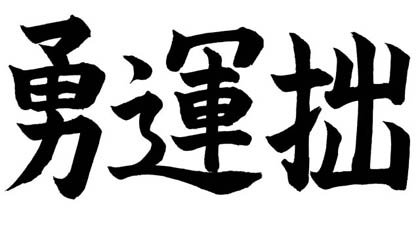Do nothing which is of no use
 Watching one more time the Hakone taikai embu we just could not get tired detailing sensei’s kata interpretations and styles. All the sensei are rendering the kata’s riai (story) so perfectly and in such a way that even on TV you can feel/see the kasso teki.
Watching one more time the Hakone taikai embu we just could not get tired detailing sensei’s kata interpretations and styles. All the sensei are rendering the kata’s riai (story) so perfectly and in such a way that even on TV you can feel/see the kasso teki.
Of course all the presented sensei are Iaido’s top of the top. They all are 8th dan Kyoshi/Hanshi with more than 35 years of experience, not only in Iaido but for most of them in various other Budō. One of them in particular catched our attention because his materialization of the kasso teki is terrific. We had the opportunity to see him “live” during one of our iaido trip and he simply left us speechless …
It is Satō Yosoichi (佐藤 四十一) sensei 8th dan Kyoshi Iaido, 7th dan Kendo from the Okayama prefecture. In December, while shopping in Kyoto we jumped on the last “Tora no maki” and as I was decrypting it – not reading “Help Yuki” – We were very happy to find an interview of Sato sensei and decided to translate it resuming the key points.
Understanding what the enemy is doing and how he is moving. Reacting accordingly to the story, this is the waza.
 I always practice Koryu and ZKR Iai with the same care, being aware of the kihin, kigurai and todome “Coup de grace”. Always consider what the enemy is doing and how he is moving. For example, in the 3rd ZKR Iai kata “Ukenagashi”, if the enemy is not targeting and cutting the head then the waza will not be respected. Therefore we have to think how to give him the envy to cut our head. If we draw the katana too fast to protect our head, it will not work. There is to be a moment where we are going to be cut, where the enemy sees an opening, an opportunity to attack. It is at that moment, at the very last time, that we surprise the enemy and win by doing the ukenagashi. Whether in Koryu or ZKR Iai, if you can not express this, don’t you think there is no waza ?
I always practice Koryu and ZKR Iai with the same care, being aware of the kihin, kigurai and todome “Coup de grace”. Always consider what the enemy is doing and how he is moving. For example, in the 3rd ZKR Iai kata “Ukenagashi”, if the enemy is not targeting and cutting the head then the waza will not be respected. Therefore we have to think how to give him the envy to cut our head. If we draw the katana too fast to protect our head, it will not work. There is to be a moment where we are going to be cut, where the enemy sees an opening, an opportunity to attack. It is at that moment, at the very last time, that we surprise the enemy and win by doing the ukenagashi. Whether in Koryu or ZKR Iai, if you can not express this, don’t you think there is no waza ?
I also think that seme, the way it is performed is a very important point. To achieve a good seme, you must do it using your body, as described in the Gorin no sho “The body merging with the katana, united, becoming one”.
In Kendo it frequently happen that when competing against talented kendo sensei, you know in advance that you are most certainly going to be hit without being able to avoid it. This is the perfect opportunity to work on what we can describe as Kigurai. Knowing that we will maybe loose is an essential part of the drill, it force us to be more confident and decided, to use our experience while staying calm and give our best.
Satō sensei – Hakone taikai: 1st place 2009, 2nd place 2005
I started my Iaido learning in 1964. At the beginning I received the teaching of the youngest Yamashibu sensei brothers, Yasuo. After some time I followed the teaching of the eldest brother, Yoshikazu. Both brothers were Iaido 8th dan and student of Yamamoto Haruzuke, himself student of Oe Masamichi. Yasuo sensei was very strict, he teached me the waza in detail focusing on the technical aspects: body and foot positions, hands usage, height of the cut. Yoshikazu sensei on his side had a simple teaching motto, he always said “If it is Iaido, it has to cut” always insisting on the fact that the cut is the most important point and that if there is no proper cut then there is no Iaido. Yamashibu Yoshikazu sensei was famous for his ample and elegant Iai, that is why I try in my day to day practice to perform big an apply what I learned. I was very lucky to learn from those two sensei, having closely followed the two different teaching methods.
Last year, I presented and passed my 7th dan kendo grading after 28 years without trials. To prepare myself I read many kendo books and was impressed by Morita Bunjuro’s book “Koshi to tanden de okonau Kendo”. Another very interesting book edited when I was 20 years old is the “Taikakusen undo”.
It is impossible for me to describe in one word why Iaido is attracting me. But for an office employee like me, I would simply state that through keiko I made a lot of new friends and I have the feeling that my life has expanded thanks to Iaido.
“Tora no maki” Vol. 3
Y & M
** We are no professional translators and our translation will contain errors. The above article translation is not word for word and is only made to give a general idea of the article.
Posted: February 18th, 2011 under Article, Iaido.
Tags: Hakone taikai, kigurai, Sato sensei, seme, todome, Tora no maki



